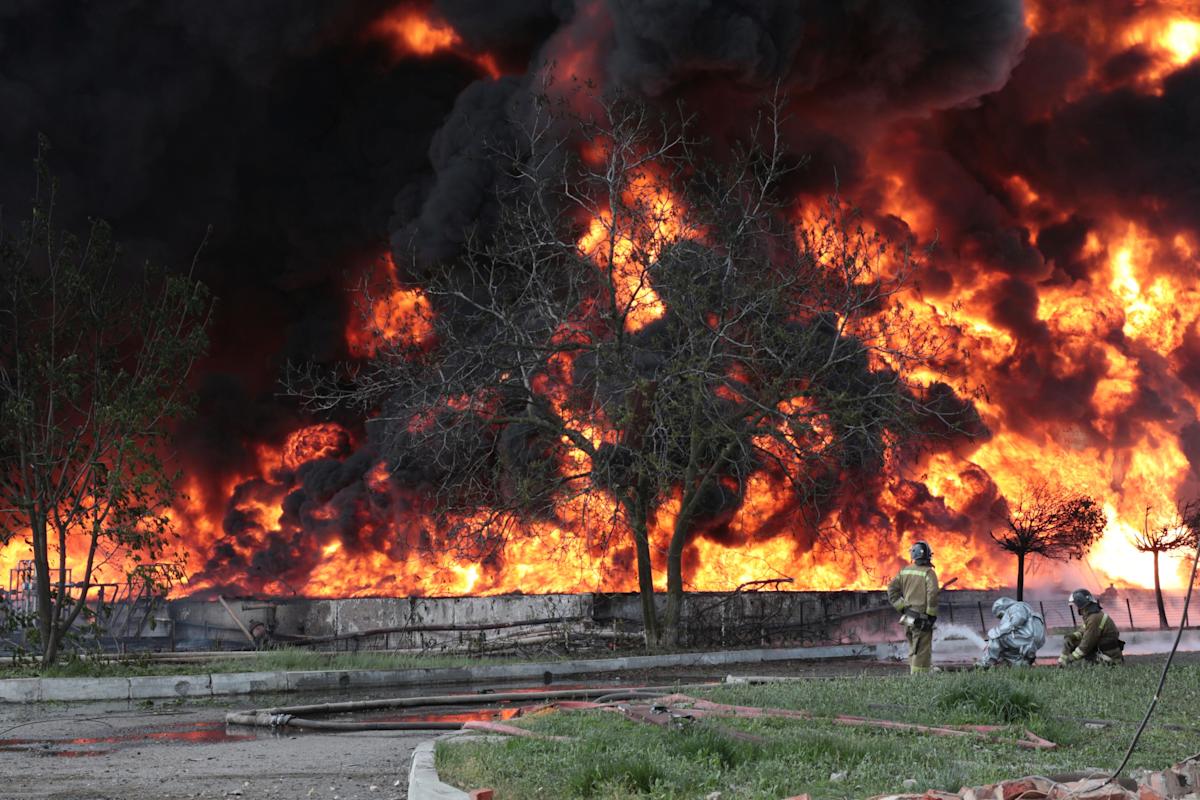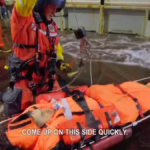
The United Nations says more than 300 civilians from the besieged southeastern city of Mariupol and four other towns have been evacuated to Ukrainian-held Zaporizhzhia in a second successful operation to get civilians out of areas subject to Russian shelling and attacks.
Osnat Lubrani, the U.N. humanitarian chief in Ukraine, said in a statement that many of the civilians from Mariupol, Manhush, Berdiansk, Tokmak and Vasylivka came Wednesday with nothing but the clothes they were wearing and are now getting humanitarian assistance. She said they’ll also receive “much- needed psychological support.”
Her statement did not say whether the evacuation included any civilians from the Azovstal steel mill in Mariupol which is surrounded by Russian troops and reportedly came under renewed fire Wednesday.
Ukrainian President Volodymyr Zelenskyy says they are trying to reach an agreement to save people at the Azovstal mill, where there are still civilians, including women and children. He said the 344 evacuated Wednesday are in addition to the more than 150 people who were evacuated earlier this week from the bunkers under the city’s steel plant.
___
KEY DEVELOPMENTS IN THE RUSSIA-UKRAINE WAR: — AP evidence points to 600 dead in Mariupol theater airstrike
— EU takes major step toward Russian oil ban, new sanctions
— Russia storms Mariupol steel plant as some evacuees reach safety
— Pope Francis struggles to make progress in Ukraine peace effort
— EU eyes sanctions for head of the Russian Orthodox Church
Follow all AP stories on Russia’s war on Ukraine at https://apnews.com/hub/russia-ukraine
___
OTHER DEVELOPMENTS:
The commander of the main defending force at the Azovstal steel mill in the strategic Ukrainian port city of Mariupol says Russian troops have broken into the territory of the mill, where limited evacuations of besieged civilians occurred last week.
The Russian government, meanwhile, pledged to facilitate humanitarian corridors from Thursday through Saturday to enable more evacuations.
In a video posted Wednesday, Denys Prokopenko, commander of the Ukrainian Azov regiment, said the incursions had continued a second day “and there are heavy, bloody battles.”
Azovstal remains one of the biggest hubs of Ukrainian military resistance and has been subjected to massive Russian aerial bombardments and shelling. Russian State TV showed smoke rising over Azovstal.
Hundreds of Ukrainian forces from different parts of the army, as well as civilians, remain in the plant’s underground shelters.
___
Sweden’s foreign minister says the United States is willing to provide “security assurances” during the application period if Sweden and neighboring Finland seek membership in NATO.
Ann Linde spoke to Swedish public broadcaster SVT on Wednesday from Washington after meetings with U.S. Secretary of State Antony Blinken and members of the Senate Committee on Foreign Relations.
Linde said there is great interest from the U.S. in Sweden and Finland joining NATO.
Jolted by Russia’s invasion of Ukraine, Sweden and Finland appear ready to revoke their long-standing policy of military non-alignment and apply for NATO membership.
Russia has warned of unspecified consequences if that happens and both countries have been looking for some form of NATO protection from the moment they apply to when they become members, a process that can take months.
___
A Russian government statement said its armed forces and their allies would open a humanitarian corridor on specified hours from Thursday through Saturday from the Azovstal steel mill in Mariupol, Ukraine, so civilians can be evacuated.
The statement appeared on the Telegram messaging app Wednesday and pledged the forces would refrain from military actions, withdraw to a safe distance and facilitate the withdrawal of the civilians to any destination they choose.
But there was no immediate confirmation of those arrangements from other sources and similar promises to set up evacuation corridors have collapsed, because of what the Ukrainians blamed on continued fighting by Russians. A United Nations spokesman said discussions about future evacuations were ongoing.
___
Air raid sirens sounded in cities across Ukraine on Wednesday night and missile fire followed shortly after in the cities of Cherkasy, Dnipro and Zaporizhzhia.
In Dnipro, Mayor Borys Filatov said one strike hit the center of the city. The strikes in Dnipro also hit a railroad facility, authorities initially said, without elaborating. Ukrainian Railways said none of its staff were injured in the Dnipro attack.
Complaining that the West is “stuffing Ukraine with weapons,” Russia bombarded railroad stations and other supply-line points across the country. Meanwhile, the European Union moved to further punish Moscow for the war by proposing a ban on oil imports, a crucial source of revenue for Russia.
___
BERLIN — German Chancellor Olaf Scholz says the sanctions imposed by his country and others against Moscow over its war in Ukraine will set back Russia’s economic development by decades if they remain in place.
Scholz told reporters in Berlin on Wednesday that Russia cannot hope to win a peace with Ukraine unless Kyiv supports it.
“A peace by diktat will not work,” he said.
___
In a video message posted on Twitter, Ukraine’s Foreign Minister Dmytro Kuleba welcomed the European Union’s decision to propose an embargo on Russian oil. He said Ukraine isn’t happy it will be delayed for several months, but “it’s better than nothing.”
Kuleba said it should be clear now “that times for half-sanctions or half-measures when it comes to sanctions is gone.” He says the EU can no longer support Ukraine on one hand by imposing sanctions, while continuing to pay Russia for oil and gas and support their “war machine.”
He also said if any country continues to oppose the embargo on Russian oil, it will be a reason to say the country is complicit in the crimes committed by Russia in Ukraine.
The proposals need unanimous approval from EU countries and are likely to be the subject of fierce debate. Hungary and Slovakia have already said they won’t take part in any oil sanctions. They could be granted an exemption.
___
BUDAPEST, Hungary — Hungary’s foreign minister says the country won’t support a European Union proposal for banning oil imports from Russia in a move that could derail the bloc’s efforts to apply united pressure against Moscow over its war in Ukraine.
In a video on social media, Hungarian Foreign Minister Peter Szijjarto said Wednesday that Hungary’s energy supply “would be completely destroyed” by an EU embargo of Russian oil, which he said would make it “impossible for Hungary to obtain the oil necessary for the functioning of the Hungarian economy.”
Szijjarto’s statement came as European Commission President Ursula von der Leyen proposed that EU member nations phase out imports of crude oil within six months and refined products by the end of the year as part of a sixth package of sanctions against Russia.
The proposals must be unanimously approved to take effect, and reluctance by governments in Hungary and Slovakia to support sanctions against Russian fossil fuels has placed roadblocks before a united EU response.
Szijjarto said Hungary would only support the sixth round of sanctions if oil imports were exempted.
___
LONDON — Britain announced a further raft of sanctions against Russia, banning the country from doing business with management consultants, accounting and PR firms in the U.K.
The British government also imposed asset freezes and travel bans on journalists working for state-owned media and other broadcast organizations the U.K. accuses of spreading propaganda.
The sanctioned individuals include three journalists embedded with Russian forces in Ukraine: Evgeny Poddubny, Alexander Kots and Dmitry Steshin.
The British government said the new sanctions would mean social media, internet services and app stores must take action to block content from two of Russia’s major sources of alleged disinformation, RT and Sputnik. Both have been pulled from British airwaves.
Tech and Digital Economy Minister Chris Philp said RT and Sputnik “have churned out dangerous nonsense dressed up as serious news to justify Putin’s invasion of Ukraine.”
___
BERLIN — German Chancellor Olaf Scholz says Russian President Vladimir Putin has “completely miscalculated with his brutal war of aggression against Ukraine” because it has led NATO to strengthen its eastern flank, resulted in comprehensive sanctions against Russia, and prompted large-scale military support for the Ukrainian side.
Scholz said Wednesday that Germany is currently considering supplying Ukraine with howitzers, in addition to Gepard anti-aircraft guns and other equipment the government has already agreed to send.
He spoke to reporters in Meseberg, near Berlin, alongside German Finance Minister Christian Lindner, who announced plans to require that Russians who are subject to sanctions have to disclose their assets in Germany or risk fines.
Economy Minister Robert Habeck said the government is also planning to make it easier for Russians fleeing their home country to find work in Germany.
“We can really use them,” he said, but added that there would be security checks to ensure that “we don’t bring a lot of spies over here.” ___
SOFIA, Bulgaria — Bulgaria’s parliament has approved providing additional aid to war-torn Ukraine following a debate that had rattled the governing coalition.
The proposal, introduced by the centrist party of Prime Minister Kiril Petkov, was supported by 200 legislators. Sixteen were against, one abstained, while 23 lawmakers were not present.
The vote took place after Ukrainian President Volodymyr Zelenskyy sent a letter to the parliament in Sofia. Instead of weapons deliveries, he reportedly asked for damaged Ukrainian military equipment to be repaired at Bulgarian plants and then sent back.
While three of the parties in the four-party ruling coalition had been in favor of sending weapons and ammunition to Ukraine, the fourth party, the pro-Russian Socialists, threatened to quit the coalition if such aid were approved.
The decision also includes Bulgarian assistance for the export of Ukrainian grain via Bulgaria’s Black Sea ports, and Bulgaria importing electricity from Ukraine.
___
COPENHAGEN, Denmark — British Defense Secretary Ben Wallace reaffirmed his country’s strong support for Finland and Sweden potentially joining NATO.
Finland and Sweden are expected to announce next week whether to seek membership of the 30-nation alliance.
“I cannot conceive that we would not come to support,” Wallace told reporters. “We will do whatever we need to do.”
Wallace said Finland was “in a pole position” to join NATO and the British Parliament would be able to ratify a Finnish membership “quickly.”
Wallace on Wednesday observed a military exercise in western Finland involving troops from the United Kingdom, Latvia, the United States and Estonia.
___
KYIV, Ukraine — Ukrainian President Volodymyr Zelenskyy says his country could not accept a deal with Moscow that would allow Russian troops to remain in occupied territory.
Speaking to participants in the Wall Street Journal CEO Council Summit, Zelenskyy said Ukrainian forces had halted the Russian offensive in what he described as the first stage of the conflict.
In the second stage, he said, Ukraine would expel Russian troops from its territory and in the third, would move to fully restore its territorial integrity.
Zelenskyy said he would not accept a cease-fire deal that would allow Russian forces to remain in their current positions. “We will not accept a frozen conflict,” the president said without giving further details.
Zelensky emphasized that Russian President Vladimir Putin must agree to meet him to negotiate any deal to end the fighting.
He said it was important to continue peace talks but noted that “until the Russian president signs it or makes an official statement, I don’t see the point in such agreements.”
___
LVIV, Ukraine — New satellite images analyzed by The Associated Press suggest fighting may be ongoing at a besieged steel plant in Mariupol.
The Kremlin is denying that Russian forces are trying to storm the Azovstal plant, the last remaining holdout of Ukrainian fighters in the port city.
An image shot by Planet Labs PBC at dawn Wednesday showed black smoke rising at one side of the plant near a canal. Buildings at the plant, including one under which hundreds of fighters and civilians are likely hiding, showed large, gaping holes in the roof. Debris littered the grounds.
Meanwhile, another satellite photo showed that a recent Russian missile attack tore a hole in a key bridge near Odesa.
Russia has attacked the bridge on three occasions. Though it is still standing, a chunk of the bridge is missing toward its south end, the image shows.
___
KYIV, Ukraine — Ukraine’s Interior Ministry says a road crash in the western Rivne region has killed 26 people and injured 12 more. The collision involved a bus, a van and a fuel truck, the ministry said. The bus had been headed to Poland, which has been a key destination for Ukrainian refugees.
According to a ministry statement, the accident occurred because the van “performed a maneuver to overtake another vehicle, and drove into the oncoming lane, where it collided with a fuel truck.”
It wasn’t immediately clear how a Poland-bound bus with 34 passengers on board became part of the accident.
___ MOSCOW — The Kremlin has rejected media reports that President Vladimir Putin might formally declare war on Ukraine on May 9, when Russia celebrates the defeat of Nazi Germany in World War II, and announce a broad mobilization.
Kremlin spokesman Dmitry Peskov dismissed the reports as “untrue” and “nonsense” at a daily conference call with reporters.
Western media reported earlier this month, citing U.K. and U.S. officials, that Putin might pivot from a “special military operation” to an all-out war with Ukraine, which would allow him to introduce martial law and mobilize reservists.
The reports said Putin could announce the changes during Victory Day celebrations on May 9, Russia’s most important holiday. ___
MOSCOW — The Russian defense minister has warned that Moscow will see any Western transports carrying weapons into Ukraine as legitimate targets.
Sergei Shoigu’s statement Wednesday comes as the U.S. and other Western allies have increased shipments of weapons to Ukraine. Speaking at a meeting with top military officials, Shoigu denounced the West for “stuffing Ukraine with weapons.”
“Any NATO transports carrying weapons or resources for the Ukrainian military that arrives in the country’s territory will be seen by us as a legitimate target to be destroyed,” he said.
The Russian military has repeatedly reported strikes on Ukrainian depots containing Western weapons. Striking Western transports delivering them would mark a significant escalation in the conflict.
___
MOSCOW — Belarus has announced snap military exercises amid the Russian war in Ukraine, while insisting it would not threaten any neighbors.
The Belarusian Defense Ministry said the exercises that began Wednesday would be used to assess the readiness and capability of the country’s armed forces, and the military’s ability to operate on “unknown terrain in a rapidly changing situation.”
The ministry did not say how many troops are involved in the exercises but noted that their number would be gradually increased.
It said the maneuvers “do not threaten the European community in general and any neighboring countries in particular.”
Belarus allowed its ally Russia to use its territory as a staging ground before Moscow launched its military action in Ukraine on Feb. 24.
___
KYIV, Ukraine — Ukrainian officials say evacuations from the besieged port of Mariupol will continue on Wednesday.
Deputy Prime Minister Iryna Vereshchuk said evacuations from Mariupol and three other locations to Zaporizhzhia, a city in southeast Ukraine, would take place “if the security situation permits.”
The governor of the Donetsk region, Pavlo Kyrylenko, confirmed that evacuation buses had already left Mariupol and would stop at three other locations to pick up more passengers.
Kyrylenko said the effort is supported by the United Nations and the International Red Cross.
___
BRUSSELS — The European Union plans to sanction the head of the Russian Orthodox Church, Patriarch Kirill of Moscow, in its next round of measures against Russia, according to several EU diplomats.
The three people with direct knowledge of the discussions were not authorized to speak publicly as negotiations on the sixth EU package of sanctions between the 27-nation bloc’s ambassadors were ongoing Wednesday.
Kirill is a longtime ally of Russian President Vladimir Putin and has justified his country’s invasion of Ukraine.
Kirill has also echoed Putin’s unfounded claims that Ukraine was engaged in the “extermination” of Russian loyalists in Donbas, the breakaway eastern region of Ukraine held since 2014 by Russian-backed separatist groups.
If the sanctions proposed by the EU’s executive arm are approved by EU member countries, Kirill would be added to the EU’s updated list of individuals facing travel bans and a freeze of assets.
A total of 1,093 individuals, including Putin and oligarchs, as well as 80 entities, are already subject to the punishing measures.
— Reported by Samuel Petrequin
___
BRUSSELS — The European Union’s chief executive is proposing that the bloc ban oil imports from Russia over its war on Ukraine, and target the country’s biggest bank and major broadcasters in a new round of sanctions.
European Commission President Ursula von der Leyen told EU lawmakers Wednesday that the sanctions should involve “a complete import ban on all Russian oil, seaborne and pipeline, crude and refined.”
She says the aim is to “make sure that we phase out Russian oil in an orderly fashion, in a way that allows us and our partners to secure alternative supply routes and minimizes the impact on global markets.”
The sanctions proposals are to be debated by the 27 EU member countries. Hungary and Slovakia have already said they would not take part. The two are landlocked and heavily dependent on Russia for their energy supplies.
Banks are also in the EU executive arm’s sights, notably the giant Sberbank. Von der Leyen says the aim is to “de-SWIFT Sberbank,” as well as two other banks. SWIFT is the major global system for financial transfers.
Von der Leyen says those alleged to be spreading disinformation about the war in Ukraine should be targeted, notably three big Russian state-owned broadcasters. She did not identify any of the outlets.




